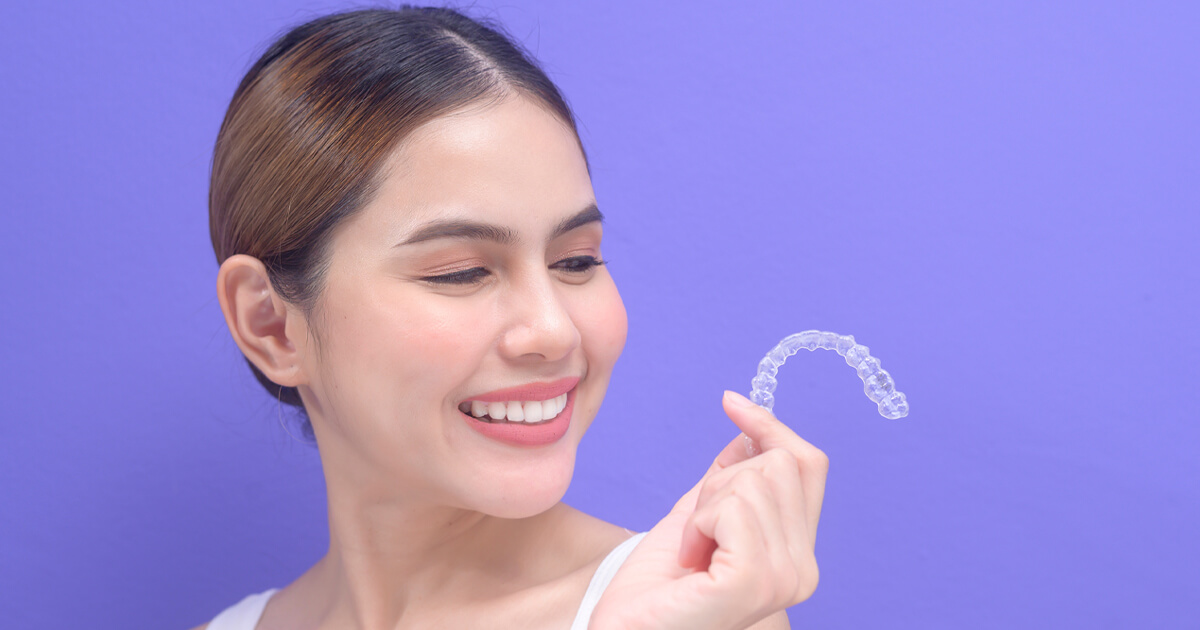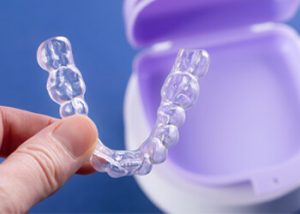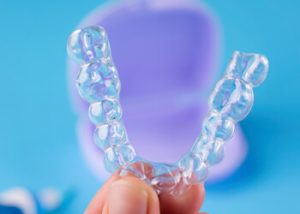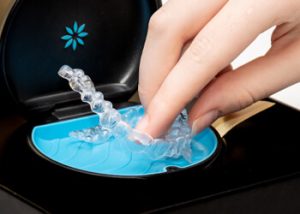Can Invisalign® Correct An Overbite? Discover How It Works

You may be wondering if Invisalign can fix your overbite, and the answer is yes! Though it may seem like a surprising option, clear aligners are just as effective as other methods. Keep reading to learn more about how this newer treatment option works.
The factor that will affect your outcome the most is the skill, knowledge, and experience of your dental practitioner. As for clear aligners fixing overbites -the results differ from person to person, depending on the severity of the overbite, as well as on whether or not they consistently wear their aligners.
There are many treatment options available for overbites, and Invisalign® is just one of them. Instead of worrying about which product will be used, focus on getting the best overall outcome. The dentist can often treat an overbite with clear aligners, depending on the severity of the case.
Different types of overbites
There are two different types of overbites: vertical and horizontal. A vertical overbite is when your top teeth overlap with your bottom teeth significantly. Horizontal overbites happen when your top teeth jut out in front of your bottom teeth.
 Although they look different, these two types of overbites share many similarities. They are both brought on by dental or skeletal problems. The type of overbite you have -dental or skeletal- will affect the orthodontic treatment plan.
Although they look different, these two types of overbites share many similarities. They are both brought on by dental or skeletal problems. The type of overbite you have -dental or skeletal- will affect the orthodontic treatment plan.
Dental overbites occur when teeth are not aligned properly, while skeletal overbites indicate a problem with the jaw. Depending on which type of overbite you have will determine what kind of approach your dentist takes to fix it.
Commonly, overbites are genetic; however, they can also be caused by poor oral habits during childhood, such as sticking out your tongue often, biting your nails or sucking on a pacifier or thumb for long periods of time. The majority of jaw growth takes place during the early developmental years, so bad habits frequently lead to unequal growth.
Can overbite cause other problems?
Having an overbite can lead to a multitude of physical problems, such as
- Trouble eating and chewing
- Speech challenges
- Strained muscles and jaws can lead to jaw pain.
- Difficulty with jaw movements
An overbite can cause a number of problems, including gum disease, cavities, and the need for fillings. In severe cases, it can also damage soft tissue or lead to migraines, headaches, arthritis, joint problems, and digestion difficulties.
Depending on the direct cause of your overbite- which could be genetic or from childhood habits- the treatment you receive will vary. However, a dentist usually has extensive experience with this dental issue, and therefore, it would be best to seek their advice before making a final decision. Something to keep in mind is that clear aligners might do the trick just as well as metal braces but without being as conspicuous.
 The severity of your overbite
The severity of your overbite
This is classified by doctors based on the number of teeth overlapping. In more extreme cases, there may be a lot of crowding in the mouth, which can make it difficult to realign the teeth with clear aligners. Depending on each individual situation, other options that might work better include traditional braces, extractions or jaw repositioning surgery.
How to fix an overbite with clear aligners like Invisalign?
Clear aligners are a rising star in the orthodontic world, quickly becoming popular for treatments including correcting underbites and overbites.
The procedure for teeth straightening is done without brackets or wires and is effective. You receive a series of customised, removable trays that are clear from a well-known brand called Invisalign. These trays are made out of plastic which makes them more discrete than some other popular options people go for.
Invisalign uses cutting-edge 3D graphics and technology, in addition to traditional orthodontic methods, to slowly but surely move your teeth into a straighter final position. Each tray in the series is designed specifically for you and where your teeth should be at that stage of treatment. By putting pressure on different areas of your mouth with each tray, Invisalign gradually moves your teeth closer to the desired ending position.
In order to create a personalised treatment plan for you, your dentist will first take x-rays and 3D dental impressions. With this information, they can design custom aligners that will be most effective in correcting your smile.
Every two weeks, you will switch your current tray with the next one in the series. This way, your teeth will gradually be moved into place. Eventually, your overbite will improve, and you’ll have a healthier smile overall.
 What are the benefits of Invisalign?
What are the benefits of Invisalign?
If you’re looking to maintain a more natural appearance while still correcting an overbite, clear aligners are for you. easier dental hygiene as well Not to mention, brushing and flossing is a breeze with aligners since all you have to do is remove them.
And if you’re worried about making dietary sacrifices, don’t be! Aligners can be removed for up to 2 hours out of the day.
How long does it take to correct an overbite with clear aligners?
Because each case is different, it’s tough to say how long clear aligners will take to fix an overbite. That being said, on average, treatment falls between 6 and 20 months.
Is Invisalign treatment right for you?
If your dentist believes that clear aligners are the best type of treatment for an overbite or underbite, you can expect numerous benefits in regard to your lifestyle. For instance, as we briefly mentioned before, you’re able to take out the trays when eating and also clean your mouth more easily. However, you must keep your aligners on for 22 hours every day to prevent delaying the treatment time.
The best part is that the aligners are unnoticeable for the entire duration of the treatment, which depending on how severe your overbite is, can take anywhere from 6 to 20 months. Talk to your dentist about your lifestyle and the different treatment options available so that you can make an informed decision if clear aligners are right for you.
How to take care of Invisalign?
- A great way to care for your Invisalign trays is to frequently clean them. You should develop a habit of cleaning them both in the morning and at night when you brush your teeth. Use toothpaste and a soft toothbrush to lightly scrub both aligners. This will eliminate the bacteria from your aligners that could otherwise harm your teeth or even affect your health.

- Although you might be tempted to use soap, denture cleaner, or mouthwash on your aligners for extra cleanliness– don’t! These ingredients can actually damage the device and make it appear less clear.
- Rinsing your aligners will help to remove any saliva or plaque that might be on them before you put them back in their case. Even when you’re not at home, it’s important to rinse them off; otherwise, they can become a breeding ground for bacteria! Before taking them out, just make sure you’re near a sink or drinking fountain.
- Cleaning your aligners is simple and only requires a few minutes out of your day! First, place the Invisalign cleaning crystals into a cup with lukewarm water. Next, add your tray to the mixture and let it soak for 15 minutes. After that, brush off any residue from the tray with a toothbrush – ensuring it’s clean and bacteria-free! Lastly, pop them back in so nobody can tell you’re wearing them – because they’ll be virtually invisible again!
- It is essential that you brush and floss your teeth before putting on your Invisalign aligners because if plaque or food debris becomes trapped, it could cause cavities or gingivitis.
Book an assessment today
Schedule an appointment with My Local Dentists to discuss the correction of your overbite with clear aligners. You can visit any of our five different locations that are near to you; our friendly dentists will be happy to offer you professional dental advice for your overbite
References
Can Invisalign fix an overbite?
https://www.healthline.com/health/dental-and-oral-health/can-invisalign-fix-overbite#:~:text=Aligners%20can%20be%20used%20to,and%20they%20won’t%20move.
3 overbite problems that may surprise you
https://www.webmd.com/connect-to-care/teeth-straightening/overbite-problems-that-may-surprise-you
